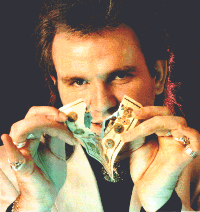
Paranormal and Mystery |
 |
| Ian Rowland appears to be able to read your mind, bend spoons, perform psychic surgery and "see" people's lives in the tarot cards. But he declares himself as psychic as a doormat and says he relies on techniques used by con men, plus some insights into human nature. |
Do you believe some people can see the future - or read your mind? We
reveal why people accept the impossible instead of understanding the subtle
tricks used by so-called psychics and clairvoyants .
On the stage the psychic energy is crackling. Two bemused members of the
audience have seen the spoons they were lightly stroking turn floppy and
break. Another has been told the contents of an envelope she had sealed before
the show and kept carefully ever since. Finally trumpets, playing cards and
other paraphernalia of the sort favoured by Victorian mediums come hurtling
over a screen, while the man behind it is tied to chair with 50 feet of
rope.
The man behind the screen orchestrating this display of the paranormal or
psi is Ian Rowland, a self-confessed fraud. But Rowland is a fake with a
mission. His stage show, played all over the country, presents a range of
psychic phenomena - spoon-bending, mind reading, psychic surgery and spirit
activity. However there's a crucial difference. He declares himself to be
as psychic as a doormat. "What I do relies on a knowledge of the techniques
used by fraudsters and con-men, plus some insights into human nature."
Your personality profile |
|
| Read the passage below and assume you've just had it
specially produced for you; that you have paid £15 for it as part of
a tarot card or astrological reading. How accurate do you think the personality
profile is? And do you think it is good value? |
|
| You have a need for other people to like and
admire you and yet you tend to be critical of yourself .While you have some
personality weaknesses you are generally able to compensate for them. You have considerable unused capacity that you have not turned to your advantage. Disciplined and self-controlled on the outside, you tend to be worrisome and insecure on the inside. At times you have serious doubts as to whether you have made the right decision or done the right thing. You prefer a certain amount of change and variety and become dissatisfied when hemmed in by restrictions and limitations. You also pride yourself as an independent thinker and do not accept other's statements without satisfactory proof. But you have found it unwise to be too frank in revealing yourself to others. |
|
Surprisingly, Rowland believes that psychic fraud is a consumer issue. "People
often get involved with psychic matters at a time when they need help," he
says. "I think they should know what is really on offer there and get help
and advice from a proper qualified source." His show issues a dramatic challenge
to all those who believe in the reality of psychic powers. After all, if
Rowland can display them, how much is left for the paranormal to explain?
His challenge is most clearly demonstrated in the case of
tarot card reading. Rowland can do tarot readings
that will have you begging for a tip for the 2.30 at Newmarket, so impressive
is his portrait of your life. He does it, he says, by a technique called
"cold reading" used by crystal ball gazers, palmists, tea leaf readers, in
fact, he says, anyone who claims clairvoyant powers. What makes him unusual
is that he is prepared to reveal how it's done. It turns out to be much more
specific than Sherlock Holmes-style deductions - like concluding someone
works on the land on the basis of their muddy boots. In fact, Rowland uses
a combination of techniques.
"To begin with, we are all much less unusual than we think we are," he says.
"People are often amazed at what I can 'see' in the cards about their early
life. What they don't realise is that I give the same account to everyone.
For instance, most of us have had one serious accident or know someone who
has. And many of us have had a relationship where distance was a problem,
and so on.
"Also people tend to do certain things at certain times in their life. So
to a man in his forties I would say, 'Something that used to be important
to you when you were a child has been coming back into you life.' That's
because men of that age have the money to indulge in their childhood hobbies
and they often do. For a women in her 30s I would certainly suggest that
babies had been in her thoughts," explains Rowland.
Exposed: how conjurers tricks are passed off as the paranormal |
|||
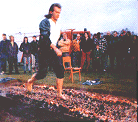 |
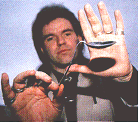 |
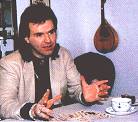 |
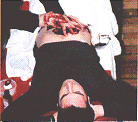 |
| Fire
walking: Ian Rowland walks on hot coals in April
of this year. The conductivity of the coals is insufficient to cause burns,
provided you walk at normal walking pace |
Spoon bending:
Uri Geller made it famous, but spoon bending
is merely an illusion that makes use of sleight of hand and misdirection
of the audience's attention |
Card
sharps: gambling cheats use manual dexterity
to get the best of their opponents in a game. Ian Rowland shows just how
easy it is to trick the unsuspecting |
Psychic surgery:
the apparent performing of an operation
using nothing but psychic ability. Easy, says Rowland, with stage blood,
butcher's bits and sleight of hand |
There's a paradox here. Officially we live in a rational, scientific society
free of ancient superstitions and magical beliefs. Yet surveys regularly
show that 50 per cent or more of the population believe in
extrasensory perception, telepathy, clairvoyance
ghosts and UFOs.
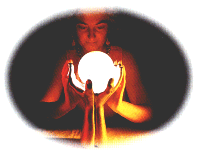 |
Learn how to tell fortunes |
| If you can combine them with a concerned and persuasive
manner, you could learn to use some of the techniques below to produce "hits"
- things that apparently couldn't have been known without psychic powers
- that will keep people believing in the reality of your ability to read
the past and future. Who does what? Knowing how common certain activities are makes hits more likely. For instance, only 35 per cent of the population smokes, but 90 per cent drinks. Retail and customer services nowadays account for most jobs. A "psychic" will mug up on these statistics. Onion skins These are statements that have layers of meaning. Just keep peeling away until the statement is accepted. "You have a daughter. A daughter-in-law? A god-daughter? A step-daughter?" Afterwards, only the fact that the right one was spotted will be remembered. Saying "daughter" when it is"step-daughter" is covered by "but you think of her as a daughter". The Push statement This is a slightly more complicated but very impressive technique if you can make a "hit". Start by making a very definite statement such as "I see you having problems with a shoe at a Christmas party". This may get a negative. But keep at it, changing the details. If it's not a shoe its an ankle, if not Christmas it's winter, if not at a party on the way to one. Sooner or later something fits and then not only have you spotted something that happened, but also something that had been forgotten. Really psychic. |
Mediums and psychics often feature in magazines, the tabloids love poltergeist
stories and for £50 the college of Psychic Studies in London will develop
your psychic abilities in just six weeks.
Sceptics often feel themselves to
be in a minority.
So has orthodox science got it wrong? Surely if over half the population
are having experiences that they feel science doesn't explain - hearing
convincing messages from the dead, knowing when a certain person is going
to ring, or having dreams that predict the future - then there must be something
in it? Many might agree with Dr Carl Becker of the Institute of Philosophy
in Japan who wrote in a journal recently: "Dimensions of the universe exist
that are objectively real but are accessible only to individuals in specific
mental states.. radically new paradigms of science may be necessary to
accommodate them."
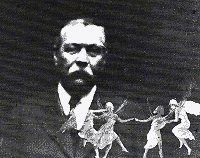 |
Sherlock Holmes' creator, Sir Arthur Conan Doyle, became
a convert to spiritualism. His belief in the Cottingley Fairies - photographs
faked by two girls showing fairies at the bottom of their garden - earned
him ridicule.(This composite photo, left, was a deliberate tease) |
But backstage, as it were, from Rowland's flashy show, many psychologists
think that widespread psychic beliefs tell us more about how the mind works
than any new truths about a dimension of reality that has been missed. One
of these is Dr
Richard Wiseman of the University of
Hertfordshire. "In research we often call people who believe in the
paranormal sheep and those who don't goats. What we have found here is that
there is a difference in the way sheep and goats see things."
Dr Wiseman has made video- tapes of people cheating while doing apparently
psychic things - bending spoons, producing objects out of thin air - in such
a way that by looking carefully it is possible to see that something fishy
is going on. "After they have seen the films we find that goats describe
what happened quite differently from sheep," he says. "The sheep are much
more likely to leave out the sequences that show there is cheating going
on."
In fact cheating is something that has dogged psychic claims since the last
century. The great escapologist Harry Houdini uncovered a number of
cases of fraudulent mediums, one of the pioneers of psychic research Joseph
Rhine later confessed that there had been serious fraud in his laboratory,
and more recently the magician James
Randi has exposed numerous cheats. However cheating is not really the
point, and it certainly doesn't explain all cases of apparent psychic phenomena.
What's involved is something much more fundamental. The "paranormal" is actually
an attempt to provide an alternative explanation:
this event should not have happened according to the known laws of the universe,
so another force must be at work. But what if there isn't any need for another
explanation? Some now believe that most day-to-day cases of psi are based
on a simple mistake.
| ESP and the Ganzfeld technique In the Ganzfeld
technique, a "receiver" has ping- pong balls over the eyes and white noise
in the ears. Shut off from sensory input, receivers are said to be more likely
to pick up incoming messages |
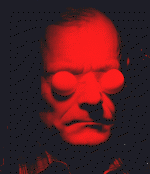 |
"People generally have a pretty poor grasp of the laws of probability,"
says Dr Christopher
French of Goldsmith's
College in London. "For example, how many people would you think you
would need in a room for there to be a 50-50 chance that two of them would
share the same birthday? A common reply is around 150, in fact it is 22.
If people don't appreciate the chances of an event occurring naturally they
may reach for a supernatural explanation where none is needed."
So can apparently paranormal events happen by chance? The odds against getting
four aces in any one poker hand are very high, but no one invokes psi when
such a hand occurs because probability says that if you play for long enough
such a hand is bound to turn up. According to Professor David Marks of Middlesex
University it is precisely this sort of confusion between short and long
term probability that fools people into looking for psychic explanations
for striking coincidences in life, such as having
a dream about something which then happens.
"Let's say that in an ordinary day you can remember 100 distinct events,"
he says, "which means, if any one can be paired with any other, then there
are 4,950 possible pairs every day, or 17,820,000 possible pairs in ten years.
Now the fact that a few of those are striking is hardly the basis for a
scientific revolution."
More show business than magic |
||
|
Spiritualism and seances were especially popular during the late 19th and early 20th century. The escapologist Harry Houdini, seen here demonstrating hew easy it is to fake an unearthly clammy hands, uncovered a number of cases of fraudulent mediums and publicised their methods of trickery so that the gullible would not be hoodwinked. |
|
| Stage show Henry and Ira Davenport (above) were brothers who had a medium stage show in the mid-19th century. They never claimed to be genuine mediums - but others did. Feet first A 19th century print showing how a fraudulent medium could suggest the idea of levitation in a darkened room. Sitters would be invited to feel the shoes. |
||
|
||
Once someone has been fooled by failing to understand probability and begins
to believe in the paranormal then there are all sorts of mechanisms for keeping
that belief in place. Like Dr Wiseman's sheep and goats, people tend to see
what they want to. Show football fans of opposing teams videos of the same
game,says Marks, and they will notice the violence of their opponents but
be blind to that of their own supporters. Dr French has found that "sheep"
are much more likely to believe they can control events than "goats", even
when evidence suggests that they can't.
It is to eliminate just such human failings that laboratory experiments were
developed. There is a long history of attempts to capture psychic phenomena
in the laboratory. At regular intervals there comes a claim that psi has
been pinned down, that results are coming in that are better than chance.
But sceptics believe that all such successes will turn out either to have
been based on fraud, or to have a more mundane explanation.
Learn the trick of reading people's minds |
| One popular demonstration of telepathy,
favoured by people like Uri Geller, involves asking
people to choose a number between one and ten or to draw a simple figure.
The "psychic" then uses his powers to say what it was. What he won't reveal
is that there is a definite hit chart when it comes to the numbers people
are likely to choose. In one study with nearly 200 people the most popular number was seven, chosen by 63 people. Six was chosen by 37 and eight by 23. Only four chose one and one chose ten. So guessing six, seven or eight ups your psychic powers immediately. Even images have their top ten. When 700 people were asked to think of a picture, 94 choose a house, 93 a circle and 77 a square.Only 17 choose a star of David and 16 a face. Asked for two geometric forms, out of 600 people, 203 chose a circle and triangle as opposed to 66 who chose a triangle and a square. |
Nearly 20 years ago, for instance, there was great excitement when the
prestigious scientific magazine.
Nature published the results
of some "remote viewing" experiments in California. These seemed to
show that people sitting in a laboratory could telepathically pick up
descriptions of places several miles away - a railway station, a church -
as they were being mentally transmitted by people visiting them. Some time
later however Nature also published a detailed analysis of this study
by Professor Marks which pointed out that when all sorts of clues were eliminated
psychic ability disappeared too.
But the psychic supporters are nothing if not determined, possibly because
magical thinking is so much part of the way many minds seem to work. Who
hasn't held onto a lucky charm, just in case? Casinos would rapidly go broke
if people approached gambling in any rational
or scientific way. The common gambling myths that the mind can control
the fall of the dice or that the spin of the wheel, and that if black
hasn't come up in roulette for ten spins then it is more likely next go,
are just the kind of thoughts that fuel belief in the paranormal. What's
more, it seems significant that such beliefs have been shown in experiments
at the gaming tables to be thoroughly without foundation.
But it hasn't stopped people trying to prove that psychic powers exist. The latest attempt is the Ganzfeld technique, in which a "receiver" sits in sensory deprivation with halves of ping-pong balls strapped over his eyes, trying to telepathically connect with a sender in another room who is concentrating on images chosen at random by a computer.
Revealed: The secrets of your Focus psychic profile |
| Pretty accurate, wasn't it? The same profile has been given
to thousands of people over the years who believed that it had been specially
composed for them, based on psychological testing, dream analysis,
astrology and fortune telling. On average around 90 per cent regard it as excellent or good. It is made up of what are called "Barnum Statements" whose special feature is not just that most people think they are true of themselves but also that they are not so true of others. Look at the pro files derived from any type of fortune telling and you will see that they are glued together with Barnum statements. Experiments show that almost any personality profile will be accepted by people as accurate if it is given to them with authority. Even reversing the sentences in this profile still had people agreeing with it, although they only rated it as "fair" rather than "good". |
This, say psi's supporters, is the experiment that will prove the validity
of the psychic experience. Rigorous and lengthy trials by the late Chuck
Honorton of the Psychophysical Research Laboratories in New Jersey, USA,
have shown that people have a success rate significantly above chance, which
suggests that extra sensory perception may be at work. But sceptics have
grave doubts.
"We know that there was a faulty connection so that the receivers were hearing
the soundtrack from the sender's moving pictures through their headphones,"
says Dr Wiseman. "It could have been enough to give some people a clue. I
think it is significant that the receivers who got the best results were
the extroverts and the artistic types, the ones you would expect to be sensitive
to subliminal cues."
Another mundane explanation or will the magic hold? Depending on whether you are a sheep or a goat so you will place your bets. What is certain is that this one is going to run and run.
Jerome Burne
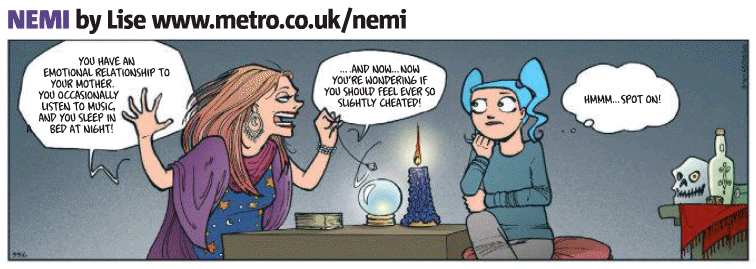
| File Info: Updated 3/4/2013 Page Address: http://leebor2.100webspace.net/Zymic/Yahoo/Omegaman/frauds.html |